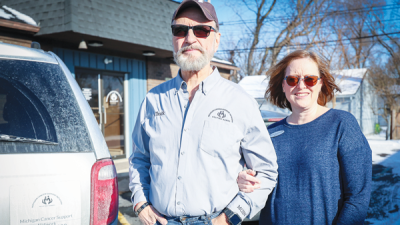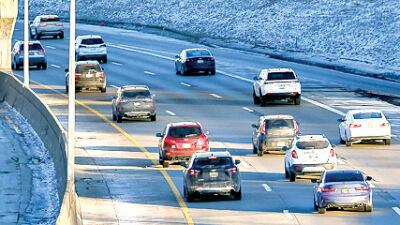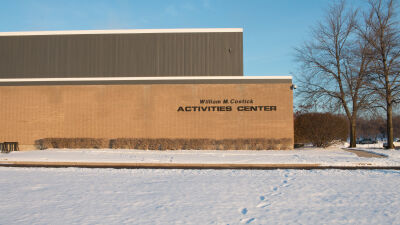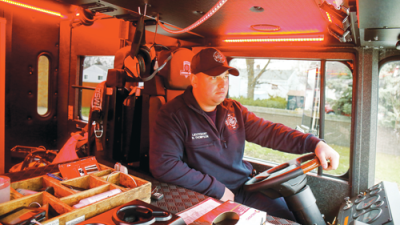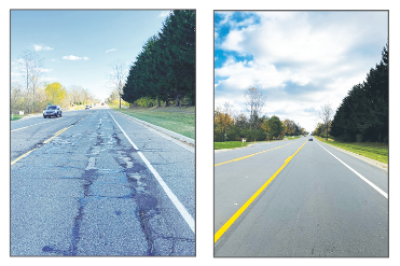
Pictured are before and after photos of a stretch of 14 Mile Road, from Drake to Farmington roads, that had some work done.
Photos provided by the city of Farmington Hills
FARMINGTON HILLS — Among the multiple decisions that Farmington Hills residents will make this November, one is whether to renew a special tax rate for improvement, rehabilitation, repair and maintenance of public roads, streets and road drainage in the city.
In 2014, voters approved 2 mills for roads, and with that millage slated to expire this year, ballot language for the Nov. 5 general election is giving them a chance to decide if they want to renew it or have it taken off of their tax bills.
If approved, the public roads and streets millage would begin with the July 2025 tax levy and last for a period of 10 years.
Two mills equals $2 per $1,000 of a home’s taxable value.
Property tax values can be found on property tax statements and by checking with the local assessor’s office.
According to Jacob Rushlow, who is the director of public services in Farmington Hills, the average taxable value of homes in the city is about $120,000, which means that at a rate of 2 mills, the average homeowner is paying $240 annually for the millage.
In Farmington Hills, according to Rushlow, the average market value of a home is $360,000.
He shared what money from the millage pays for.
“The project pays for maintenance, rehabilitation and reconstruction of the road network,” Rushlow said. “The millage will create about $9 million annually. Our plan is to spend that $9 million on major and local roads for improvement.”
According to Rushlow, projects this year have included work on industrial streets, Farmington Freeway Industrial Park, 11 Mile Road from Farmington to Orchard Lake roads, and work in subdivisions.
Potential projects going forward include work on multiple subdivisions as well as major roads, such as Nine Mile Road from Walsingham Drive to Farmington Road; Halstead Road from 12 Mile Road to 14 Mile Road and Eight Mile to Nine Mile Road; Folsom Road from Nine Mile to Orchard Lake Roads; Farmington Road from 13 Mile to 14 Mile and 10 Mile to 12 Mile; and Drake Road from Nine Mile Road to M-5.
Those are projects that are projected to start over the next five years, although exact dates have not been solidified.
“The five-year capital improvement plan is being updated every year, looking out (over) the next five years of what roads we want to address, and it goes through an analysis process, based on the road conditions, to determine how bad the condition is of the road and how much funding we have and what sections we’re going to improve,” Rushlow said.
Farmington Hills resident Eric Gould lives in a subdivision between Farmington and Drake roads. He said that this summer, a portion of work in his neighborhood was completed, which included digging up pavement.
He shared his thoughts about the millage proposal.
“I was in favor of it last time, and based upon what we’ve seen in our neighborhood, I continue to believe the importance of that millage,” Gould said.
The amount of the millage is something that Gould can live with.
“Obviously, less is better, but if this is what is required, I’ll only speak for myself and my neighborhood, but we needed it,” he said. “Seeing the results and benefiting from the work in our neighborhood, I am comfortable paying it forward.”
According to Rushlow, the city utilizes the Pavement Surface Evaluation and Rating, which is a standard for rating roads that has a 10-point scale — 1 represents the worst condition for a road and 10 represents the condition of a new road.
He said that Farmington Hills is averaging a 5.3 rating.
“About 40% of the roads are considered poor condition, and about a little more than 20% are in what we consider good condition, and everything else is in the middle there,” Rushlow said. “So our average is fair. We’d like to get that, obviously, up, to have more roads in good condition than in poor, and right now we’re still working to get to that goal of having most of our roads in good condition.”
In 2014, according to Rushlow, the city had a PASER rating of 4.2.
“We’ve started to add more good roads and get rid of some of those ones that are on the poor rating scale,” he said. “Over the 10 years of the previous millage, there has been a nice, steady trend of improving that overall PASER score every year.”
The three phases of road work are maintenance, rehabilitation and reconstruction.
Roads that receive a rating of less than 3 can be targeted for reconstruction.
“When we’re evaluating through the PASER system, and also our capital improvement plan, some roads will receive rehabilitation, and some will be reconstructed. It really just makes sense then, how can we stretch that dollar the furthest to keep our roads in good condition and extend the useful life?” Rushlow said.
From Rushlow’s perspective, 2 mills is an appropriate amount for the city to achieve its aspirations.
“The biggest message here is we’re continuing to try to meet our goals, with expectations of providing a sustainable road-funding venture that we have continued progress on,” he said. “Improving the roads includes improving safety for both pedestrians and motorists traveling through the city, reducing wear-and-tear on vehicles and helping make sure that Farmington Hills is a desirable location to live, work and do business.”
The Farmington Hills Citywide Open House will take place noon-3 p.m. Oct. 5 on the City Hall campus, located at 31555 W. 11 Mile Road.
At the open house, a booth will be set up where residents can ask questions and get more information about the millage.
 Publication select ▼
Publication select ▼

